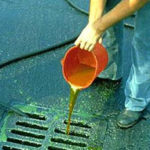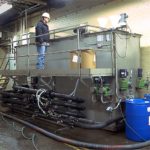Texas Manufacturers Who Generate Waste Water Must Investigate Waste Water Discharge Permit Regulations
Recognizing the Potential Need for A Waste Water Discharge Permit:
Our past experience shows that many Texas manufacturers aren’t even aware that they may require a waste water discharge permit. In sum, the only waste water from a manufacturing facility that can be “put down the drain” without a special permit is sewage from bathrooms, kitchens, etc.. Any other waste water generated from rinsing or cleaning operations, for example, CANNOT just be put down the drain to the sanitary sewer. These are generated from industrial processes and are therefore considered to be “process or industrial waste waters” and must be managed as regulated waste. We routinely hear from Texas companies who generate these types of waste waters and tell us they’ve been discharging them “down the drain for years” and had no idea that there was a problem with doing so.

Federal (EPA), state (TCEQ) and local environmental laws prohibit this practice, but local cities and towns are the ones who normally manage these requirements, and that’s because these waste waters are sent to their local waste water treatment plants, via regular sewer lines, for treatment. These municipal facilities are designed to treat common sewage and other “regular” domestic waste waters, NOT industrial wastes. The problem becomes realized when these waste waters are contaminated with, for example, heavy metals, solvents or if they have high or low PH values. These plants aren’t designed to deal with these industrial contaminants and these illegally discharged waste waters can cause major problems when unexpectedly introduced into their treatment processes.
Note again that local towns and cities are typically tasked with managing waste water discharge permits (for reasons cited above), NOT the TCEQ or EPA, who are tasked with managing the majority of other environmental compliance issues in Texas such as air emissions permitting, storm water permitting, hazardous waste management, etc.. Also note that many small towns and cities either don’t have their own treatment plants, or if they do, aren’t “sophisticated” enough to have developed their own waste water discharge permits or approval processes. This situation is very common! These facst can cause even more confusion for affected manufacturers.
Other Waste Water Discharge Permit Considerations:
So what is a manufacturer supposed to do if they generate one of these “industrial waste waters?” The first step is to analyze the process to determine what contaminants, if any, are potentially introduced into the resulting waste water. If, for example, heavy metals such as lead, cadmium, or silver, or any other chemical contamination are suspected, then the company should immediately contact a local “environmental testing lab” to consult regarding potential contamination, and have a representative sample tested. If the lab results confirm any regulated contamination, then the manufacturer must NOT dump the waste down the drain, and should immediately begin collecting the water in containers such as a tote tank, 55 gal drums, or a larger storage tank.
Containing the waste will allow for more time to determine how to properly treat or dispose of it. (Note that even if the test results don’t indicate “regulated” contamination, it’s still not permissible to dump these waste waters down the drain since, again, the waste is generated from an industrial process and therefore must be managed as a regulated waste. In such instances, the manufacturer should still contact their local authorities to apply for a waste water discharge permit).
If regulated contamination is confirmed, and depending upon the extent and type of contamination, the manufacturer must investigate potential treatment or disposal options. If through research or consultation with the lab or other expert, it’s determined that contamination doesn’t render the waste water “hazardous” (per EPA and TCEQ regulations), then the manufacturer should contact their local municipality to seek a waste water discharge permit. The municipality should be able to tell them what contaminants are acceptable and at what levels. Once this information is received, then the manufacturer can collect and send another sample to their local testing lab to determine if the waste meets those requirements. If so, then the permit application process can begin.
If, on the other hand, it’s determined that contamination is either hazardous or exceeds the municipalities discharge guidelines, then the manufacturer can either dispose of the waste using an approved treatment facility or investigate potential internal waste water treatment systems capable of treating the material to an acceptable state for discharge (or possibly for cost effective “non hazardous disposal” options). The outcome of this decision is often determined by the level of contamination, but more importantly, the volume of waste water generated. In other words, if volume is low (ie: 50 gallons per month), then it’s probably more economically feasible to collect the waste in 55 gal drums and dispose of it using an authorized and permitted 3rd party treatment facility. If, on the other hand, the volume is excessive (ie: hundreds or thousands of gallons per month) then it’s probably more feasible to invest in an internal treatment system that allows for meeting permit requirements, and discharging for cost savings purposes.
Most companies who generate large volumes of waste water end up investing in internal treatment systems in order to meet local waste water discharge permit requirements in order to save themselves from the considerable costs involved in transporting and disposing of the material to 3rd party treatment facilities, not to mention eliminating associated industrial “non hazardous” or hazardous waste generation compliance regulation requirements that in themselves can be very time consuming and costly.
This blog post is only intended to provide general guidance on how to determine whether or not manufacturers may require a waste water discharge permit and benefits of doing so, but there are many more regulatory requirements to manage and consider once the decision is made to obtain a waste water discharge permit.
Need Help Getting Compliant With Texas Waste Water Discharge Permit Issues or Disposing of Hazardous Waste Waters?
CLICK below or call 512-457-0374 to schedule your free consultation TODAY.



